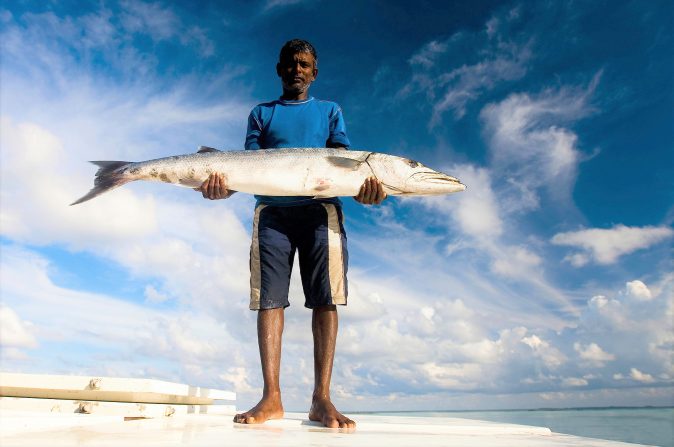Fisheries / Maldives
The world’s most sustainable fisheries call for support
The Maldivian traditional fishing industry faces serious economic challenges.

The Maldivian fishing industry did not become environmentally friendly; it always was. Industrial size nets and long lines never had a place here. For centuries, pole and line fishing has been used by fishermen to feed themselves and their families. Few fruits grow in the small islands and land is scarce for agriculture or cattle. In the Maldives, fish was a fundamental part of survival, and fishing is in everyone’s blood. Every Maldivian had a grandfather or an uncle who faced the open ocean in the traditional Dhoni vessel to bring back food for the families and communities.
Today, much like in the past, using live bait, a pole, a line and a barbless hook, seaman pull tuna out of the water one by one. Bycatch, catching non-intended species during fishing, is nearly nonexistent, protecting turtles, dolphins and stocks. Nowhere else in the world is the fishing industry so in balance with the ecosystems it depends on. Fisheries employ around 22,000 people, but some estimates indicate that as many as four times that number depend indirectly on fisheries for their income.
In recent years, international competition and low fish prices in the international markets have further reduced the industry’s profitability.This trend has forced numerous workers to make a living with other activities, a transition which, more often than not, implied relocating from local islands to the capital. This slowdown is reinforced by the fact that international markets don’t take into consideration the fishing process when prices are established. Fishing nets are not just more efficient in catching fish, they are also indiscriminate grabbers, trapping tuna, shark, turtle or dolphin, while wreaking havoc in the seabed. Long lines, with their extensive sequence of hooks dragging in fishlines in the back of boats for miles, have similar dismal impact on ocean species. Maldivian fishing companies are now investing in marketing their products to more eco-conscious consumers and investors, who understand that sustainability comes at a premium. Some are lobbying for governments in export destinations to also recognize the green status of their product and provide tax incentives, important measures in assuring the continuity of the industry. Further, the financial success of tourism has effectively raised the per capita GDP of the country from a low-income status to a middle-income status. With that climb in the financial ladder, the country had to grapple with several lost benefits, including some exemption of import duties granted to low-income nations. The main activity affected was fishing. As a result, today, Maldivian fish pays a 25 percent tax to enter consumer markets in the European Union, with considerable consequences on profitability.
This combination of factors has made Maldivian leaders aware that it is important to keep the value-chain in the country. Rather than exporting the fish frozen and unprocessed, the Maldives, through the state-owned fishing market leader MIFCO, is investing in new canning and processing capacity, with a long-term goal of processing 100 percent of the exported fish. Today, that figure stands closer to 20 percent. Based on studies developed with Japanese partners, the government is also promoting the fishing of other marine species, particularly Diamond Back Squid, an abundant inhabitant of the country’s territorial waters, which can fetch favorable prices in international markets.
Training programs are happening across the country to help fisheries diversify and become more competitive, paired with important initiatives aimed at creating jobs, reducing exposure to price shocks and giving new life to the industry.
